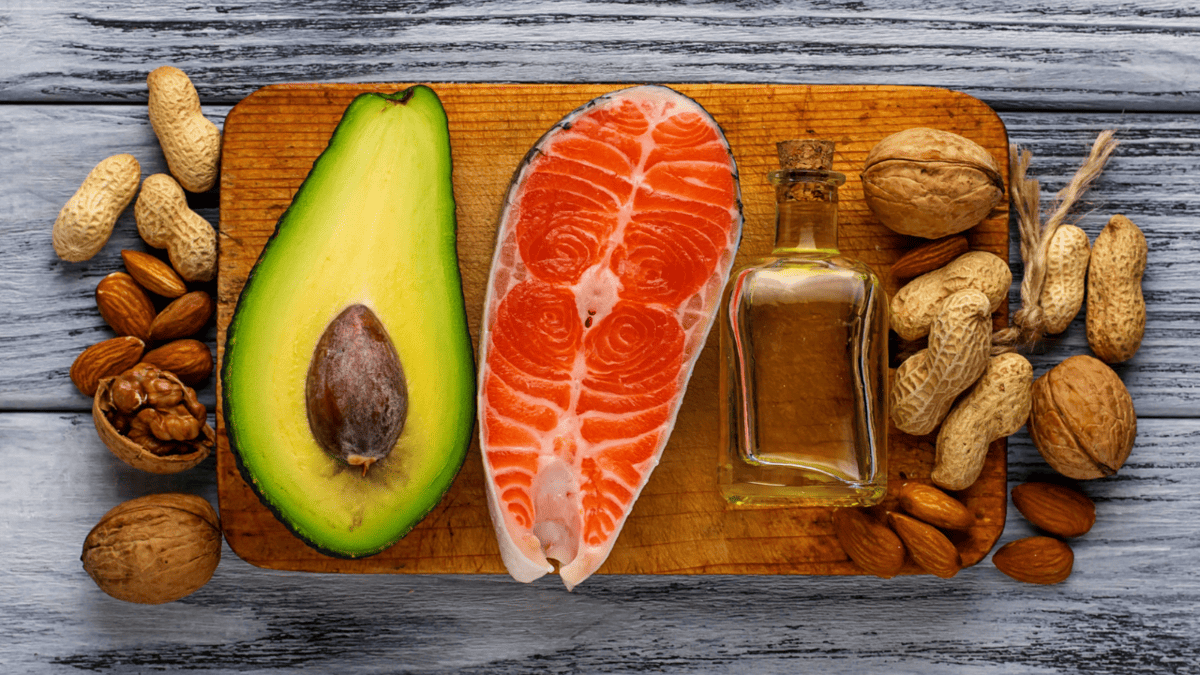Fats are an essential part of our diet, providing energy and playing a vital role in the functioning of our body. However, not all fats are created equal. In this beginner’s guide, we’ll explore the different types of fats, their impact on health, and how to make informed choices when it comes to incorporating healthy fats into our diet.
What are Fats?

Fats are an essential macronutrient that our body needs to function properly. They provide a concentrated source of energy, help transport essential vitamins and minerals throughout our body, insulate our organs, and protect our nerve cells. Fats also play a crucial role in maintaining our body’s basic functions, including regulating body temperature, building cell membranes, and aiding in the absorption of nutrients. However, it’s important to understand the difference between good and bad fats and to make informed choices when it comes to incorporating healthy fats into our diet.
Types of Fats
Not all fats are created equal, and it’s important to understand the difference between good and bad fats. Good fats, such as monounsaturated and polyunsaturated fats, can have a positive impact on our health. Bad fats, such as saturated and trans fats, can have a negative impact and should be limited.
Saturated Fats
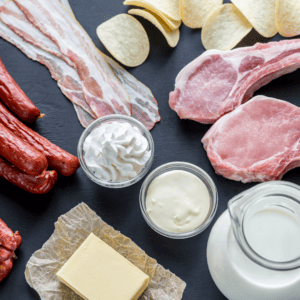
Saturated fats are typically solid at room temperature and are found in animal products such as meat, butter, and cheese. Consuming too much saturated fat can raise cholesterol levels and increase the risk of heart disease. However, not all sources of saturated fat are created equal. Some sources of saturated fat, such as coconut oil, have been shown to have a neutral or even positive impact on heart health. It’s important to limit your intake of saturated fats and choose leaner sources of protein, but incorporating moderate amounts of healthy sources of saturated fat can be part of a healthy diet.
Trans Fats

Trans fats are a type of unsaturated fat that are created through a process called hydrogenation, which turns liquid oils into solid fats. Trans fats are often found in processed foods such as baked goods, snack foods, and fried foods. Consuming too much trans fat can raise bad cholesterol levels, increase the risk of heart disease, and contribute to inflammation in the body.
The American Heart Association recommends limiting the intake of trans fats as much as possible, ideally to zero. This can be achieved by reading food labels and avoiding products that contain partially hydrogenated oils, which are a major source of trans fats. Instead, focus on incorporating healthy fats into your diet, such as monounsaturated and polyunsaturated fats found in foods such as avocados, nuts, and fatty fish.
Monounsaturated Fats
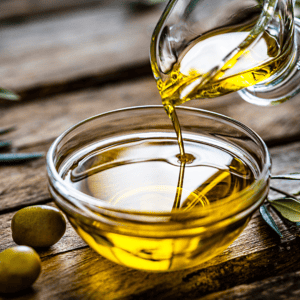
Monounsaturated fats are a type of healthy fat that can have a positive impact on heart health when consumed in moderation. They are typically liquid at room temperature and can be found in foods such as olive oil, avocados, and nuts. Studies have shown that consuming monounsaturated fats can help to lower bad cholesterol levels, reduce inflammation, and improve insulin sensitivity.
Incorporating monounsaturated fats into your diet is easy and delicious. You can use olive oil or avocado oil in cooking and baking, add avocado to salads or sandwiches, or snack on nuts such as almonds or cashews. However, it’s important to consume monounsaturated fats in moderation, as they are still high in calories. Aim to incorporate healthy fats into your diet as part of a balanced approach to nutrition.
Polyunsaturated Fats
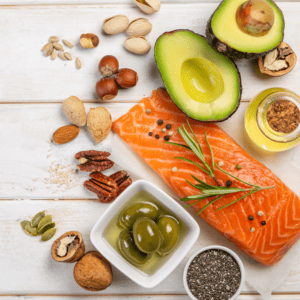
Polyunsaturated fats are an important type of fat that can have a positive impact on our health when consumed in moderation. These fats are typically liquid at room temperature and are found in foods such as soybean oil, sunflower oil, and fatty fish. One of the most significant benefits of polyunsaturated fats is their ability to lower bad cholesterol levels, which can help to reduce the risk of heart disease.
Polyunsaturated fats are also important for brain function, and studies have shown that they can improve memory, cognitive function, and mood. One specific type of polyunsaturated fat, omega-3 fatty acids, is found in fatty fish such as salmon, tuna, and mackerel. Omega-3 fatty acids have been shown to have a positive impact on heart health, brain function, and reducing inflammation in the body. It’s important to consume a balanced diet that includes healthy sources of polyunsaturated fats to reap the many benefits they have to offer.
Omega-3 Fatty Acids
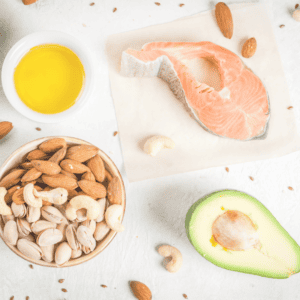
Omega-3 fatty acids are a type of polyunsaturated fat that is essential for our health. They have been shown to have a positive impact on heart health, brain function, and reducing inflammation in the body. Omega-3 fatty acids are primarily found in fatty fish such as salmon, tuna, and mackerel. However, they can also be found in plant-based sources such as chia seeds and flaxseeds.
Research has shown that consuming omega-3 fatty acids can help to lower triglycerides, reduce blood pressure, and decrease the risk of heart disease. Omega-3 fatty acids are also important for brain function and can improve memory, cognitive function, and mood. In addition, they have been shown to reduce inflammation in the body, which can lower the risk of chronic diseases such as heart disease, cancer, and arthritis. Incorporating fatty fish into your diet or taking omega-3 supplements can help ensure that you’re getting enough of these essential fats.
Omega-6 Fatty Acids
Omega-6 fatty acids are a type of polyunsaturated fat that are essential for our health. They are found in foods such as vegetable oils, nuts, and seeds, and are important for brain function, bone health, and growth and development. However, consuming too much omega-6 fatty acids relative to omega-3 fatty acids can increase inflammation in the body and may contribute to chronic diseases such as heart disease and cancer.
To maintain a healthy balance of omega-6 fatty acids, it’s important to consume them in moderation and to also incorporate sources of omega-3 fatty acids into your diet. Some sources of omega-3 fatty acids include fatty fish such as salmon and tuna, flaxseeds, and walnuts. Additionally, choosing healthy oils such as olive oil, avocado oil, and coconut oil can help to maintain a healthy balance of omega-6 fatty acids in your diet.
The Impact on Health

The impact of fats on health is a complex topic that has been extensively researched by scientists and nutritionists. Consuming too much saturated and trans fats can increase the risk of heart disease and type 2 diabetes, while consuming healthy fats such as monounsaturated and polyunsaturated fats can have a positive impact on heart health and brain function.
Saturated fats, which are often found in animal products such as meat and dairy, can raise cholesterol levels and increase the risk of heart disease. Trans fats, which are often found in processed foods, should be avoided as they can raise bad cholesterol levels and increase the risk of heart disease.
On the other hand, healthy fats such as monounsaturated and polyunsaturated fats can help to improve heart health and brain function. Omega-3 fatty acids, a type of polyunsaturated fat found in fatty fish, have been shown to have a positive impact on heart health, brain function, and reducing inflammation in the body.
It’s important to make informed choices when it comes to incorporating healthy fats into our diet. This can include choosing lean sources of protein, cooking with healthy oils such as olive oil and avocado oil, and adding nuts and seeds to our meals. By understanding the impact of fats on our health and making informed choices, we can enjoy the many benefits of healthy fats and reduce our risk of chronic diseases.
How Much Fat Do You Need?
Determining how much fat you need in your diet can be a bit of a tricky process, as it depends on various factors such as age, gender, weight, and activity level. The American Heart Association recommends that adults consume no more than 25-35% of their daily calories from fat. This equates to roughly 44-77 grams of fat per day for a 2,000-calorie diet. However, it’s important to understand that not all fats are created equal, and it’s essential to focus on consuming healthy fats rather than just any type of fat.
To calculate your daily fat needs, you can use an online calculator or consult with a registered dietitian. These professionals can take into account your specific needs and provide you with a more accurate estimate of how much fat you should be consuming each day.
It’s also essential to understand the different types of fats and their impact on health. Consuming healthy fats such as monounsaturated and polyunsaturated fats can have a positive impact on heart health and brain function, while consuming too much saturated and trans fats can increase the risk of heart disease and other health problems.
Incorporating healthy fats into your diet can be done by swapping unhealthy fats such as butter and margarine for healthy fats such as olive oil and avocado oil, incorporating nuts and seeds into your meals and snacks, and exploring new recipes that feature healthy fats. By making informed choices and focusing on consuming healthy fats, you can maintain optimal health and support your body’s basic functions.
Healthy Fats and Sources
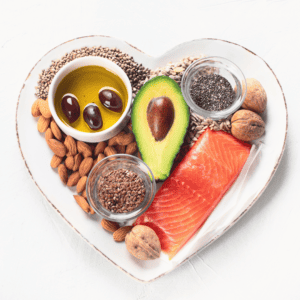
Incorporating healthy fats into our diet is essential for maintaining optimal health, and there are many sources of healthy fats to choose from. Foods high in healthy fats include fatty fish such as salmon and tuna, avocados, nuts and seeds, olive oil, and coconut oil. These foods are rich in monounsaturated and polyunsaturated fats, which have been shown to have a positive impact on heart health when consumed in moderation.
Cooking oils such as olive oil, avocado oil, and coconut oil are also high in healthy fats and can be used in cooking and baking. Nuts and seeds such as almonds, walnuts, chia seeds, and flaxseeds are all high in healthy fats and can be eaten as a snack or added to meals. Fatty fish such as salmon, tuna, and mackerel are all high in omega-3 fatty acids, which can have a positive impact on heart health, brain function, and reducing inflammation in the body.
Plant-based sources of healthy fats include avocados, nuts and seeds, olive oil, coconut oil, and soy products such as tofu. Incorporating healthy fats into meals and snacks can be easy and delicious, such as adding nuts and seeds to salads, cooking with olive oil, and using avocado as a spread. By making small changes to our diet and incorporating more healthy fats, we can enjoy the many benefits of a balanced and healthy diet.
Reading Food Labels
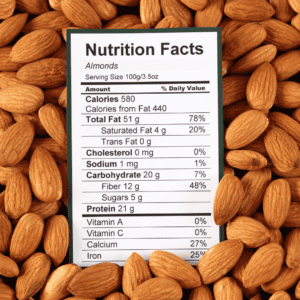
Reading food labels for fats is an important step in making informed choices about the types and amounts of fats we consume. Understanding the nutrition label can help us identify the amount of fat, including saturated and trans fats, in the product. Healthy fats, such as monounsaturated and polyunsaturated fats, are typically listed as “unsaturated fat” on food labels, while unhealthy fats such as saturated and trans fats are listed separately.
When reading food labels for fats, it’s important to be aware of the recommended daily fat intake and to choose products that are low in saturated and trans fats and high in healthy fats such as monounsaturated and polyunsaturated fats. Tips for choosing healthier fats at the grocery store include choosing lean sources of protein such as chicken, fish, and turkey, and looking for products that are high in healthy fats such as nuts and seeds, olive oil, and avocado.
By making informed choices about the types and amounts of fats we consume, we can enjoy the many benefits of healthy fats while reducing the negative impact of unhealthy fats on our health. Incorporating healthy fats into our diet through cooking with oils such as olive oil and avocado oil, adding nuts and seeds to our meals, and exploring new recipes that feature healthy fats can help us achieve optimal health and well-being.
How to Incorporate into Your Diet

There are many easy and delicious ways to add healthy fats to your meals and snacks, whether you’re cooking at home or eating out.
One way to incorporate healthy fats is to swap unhealthy fats such as butter and margarine for healthier options such as olive oil and avocado oil. These oils can be used in cooking, baking, and as a dressing for salads.
Another way to add healthy fats to your diet is to incorporate nuts and seeds into your meals and snacks. These are a great source of healthy fats, fiber, and protein, and can be added to salads, smoothies, and oatmeal.
Fatty fish such as salmon and tuna are also a great source of healthy fats, particularly omega-3 fatty acids. These can be grilled, baked, or broiled and make for a delicious and healthy meal.
Finally, exploring new recipes that feature healthy fats is a great way to add variety to your diet. Try making avocado toast for breakfast, roasted almonds with rosemary and sea salt for a snack, or salmon with avocado salsa for dinner.
Incorporating healthy fats into your diet doesn’t have to be difficult or time-consuming. By making simple swaps, adding nuts and seeds to your meals, and exploring new recipes, you can enjoy the many benefits of healthy fats while maintaining a balanced and healthy diet.
The Benefits of Eating Healthy Fats

Incorporating healthy fats into your diet can have numerous benefits for your health. Here are some of the top benefits of eating healthy fats:
- Improving heart health: Consuming healthy fats can help to reduce bad cholesterol levels and lower the risk of heart disease.
- Boosting brain function: Healthy fats such as omega-3 fatty acids are important for brain function and have been shown to improve memory, cognitive function, and mood.
- Reducing inflammation: Chronic inflammation can increase the risk of chronic diseases such as heart disease and cancer. Consuming healthy fats can help to reduce inflammation in the body.
- Aiding in weight loss and management: Consuming healthy fats can help to keep you feeling full and satisfied, which can aid in weight loss and management.
- Supporting hormone production: Hormones such as testosterone and estrogen are produced using healthy fats. Consuming healthy fats can help to support hormone production and balance in the body.
By incorporating healthy fats into your diet, you can enjoy these benefits and maintain optimal health. Try adding foods such as fatty fish, avocados, nuts, and seeds to your meals, and cooking with healthy oils such as olive oil and avocado oil.
Fats Conclusion
Incorporating healthy fats into your diet is essential for maintaining optimal health. By understanding the different types of fats, their impact on health, and how to make informed choices, you can enjoy the many benefits of healthy fats. Start by incorporating more healthy fats into your diet by cooking with oils such as olive oil and avocado oil, adding nuts and seeds to your meals, and exploring new recipes that feature healthy fats.

